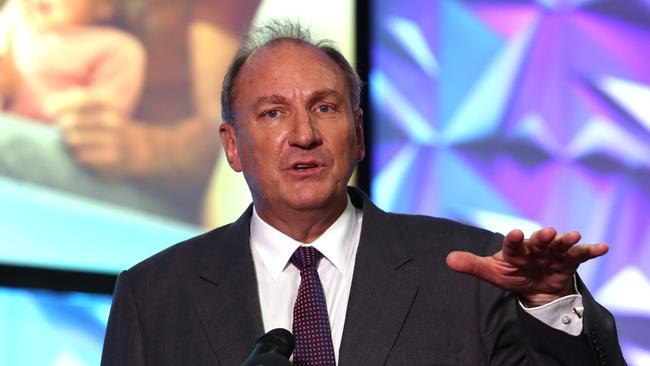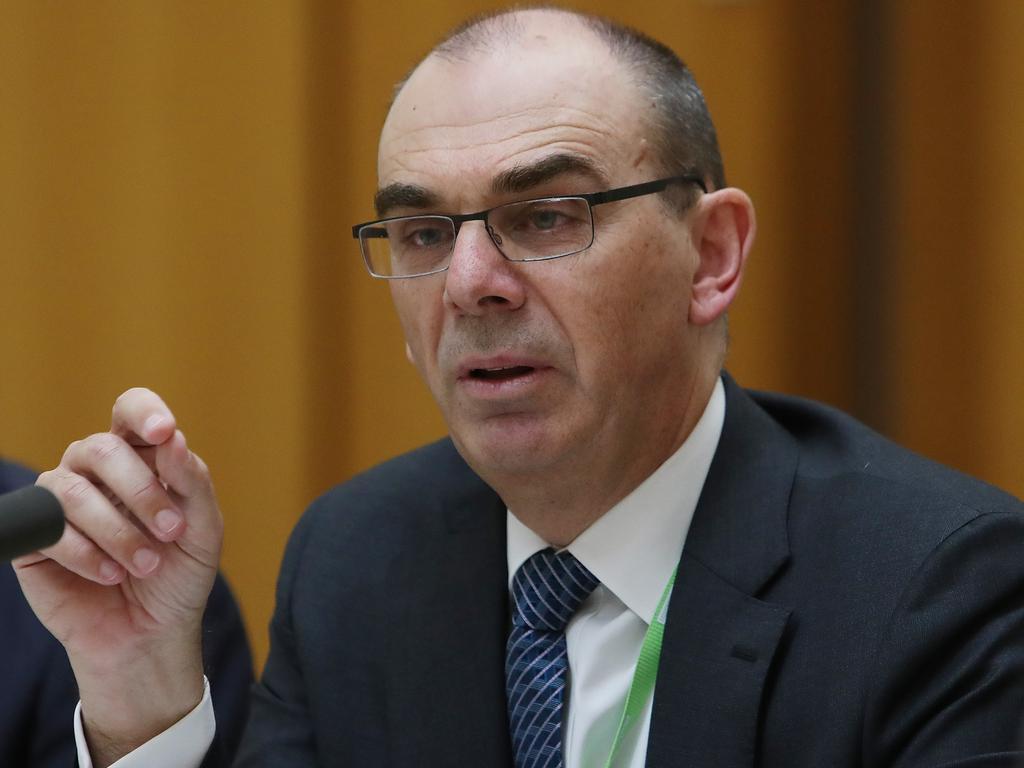Older Aussies should shoulder more COVID burden, says Telstra chair
Domestic violence, suicides, depression will keep rising if we don’t get on top of this, says one of the nation’s most respected business leaders.

Telstra and Brambles chairman John Mullen, one of the nation’s most respected business leaders, said the unprecedented lockdown of the Victorian economy had put paid to hopes of a U-shaped recovery and warned the nation would be in “real trouble” if a second wave of COVID-19 spreads to other states.
In a wide-ranging interview with The Australian, Mr Mullen — who is also chairman of Japanese-owned logistics giant Toll Holdings — made the radical suggestion that people aged 65 or over should be asked to make certain “concessions” on their behaviour during the remainder of the pandemic for the greater good of the economy.
“I am in the at-risk category, just turning 65,” he said.
“I wouldn’t have any problem with certain restrictions being placed on myself. It is really not that hard to make a few concessions on where I can go and who I can be with to do your bit for the community.
“My generation are often in a position where we are more comfortable financially. If we have to take a back seat to let the younger people drive the economy for a time, then that’s a small price to pay. Older people making a few concessions, we are in a better position to do that than younger people who are starting their careers.”
Mr Mullen’s comments add a further twist to an ongoing debate about the economic damage being caused by widespread lockdowns and border closures.
In a study released earlier this week, consulting giant McKinsey found young people in Australia were more than twice as worried about the virus impact on their own health as those aged over 75.
Almost 40 per cent of those aged 25 to 44 were “very or extremely” concerned about their health. Almost half of that group also said they had been “emotionally affected” by the pandemic, compared with only 8 per cent of the over-75s.
Research from Colonial First State published this week also found while those over 55 are more confident they can still retire as planned, Australians aged between 35-49 are the most sceptical and financially underprepared.
Social impact of new restrictions
The Sydney-based Mr Mullen said he was increasingly concerned about the social impact of new restrictions accompanying a second wave of the virus.
“You have seen it in other countries. If people can toe the line, if you have to wear a mask, for goodness sake do it. Domestic violence, suicides, depression will keep rising if we don’t get on top of this,’’ he said.
Mr Mullen’s comments came as EY released a new study from conversations with 30 CEOs across the financial services, health, power and utilities, transport, retail, government, mining and real estate sectors where they predicted a “sawtooth-shaped” recovery that demanded both financial and organisational flexibility.
The study found there was a growing recognition among CEOs that the recovery phase of the pandemic may not be smooth, and they were unsure how to model a sawtooth recovery.
Mr Mullen said if the physical infections from COVID-19 could be contained to Melbourne, “as a country we are down but not out”.
“If it goes to the other states as well, then we are in real trouble.
‘Sputtering-along-the-bottom’ recovery
“The conventional wisdom was that it would be a U-shaped recovery. That is a forlorn hope now. I think it is going to be a sputtering-along-the-bottom recovery. I don’t see GDP getting back to pre-COVID levels until 2022.
“The depth of damage done to the tourism sectors and other sectors is immense.”
Mr Mullen said that following the introduction of stage four restrictions in Melbourne he was most worried about SMEs, for whom the economic impact was going to be very major.
“Most of the big ones will survive. A lot of the little ones won’t have the stamina to do it all again. Just having got their hopes up, rehired staff and restocked inventory, now to go back down into a more severe lockdown — if it lasts for any duration, I think it is going to be very devastating.”
Mr Mullen’s three companies Telstra, Brambles and Toll Holdings will all continue to operate through the stage four restrictions.
He said while Brambles’s core pallet business was benefiting from the booming supermarket trade globally — more than 90 per cent of the company’s revenues come from offshore — he said the situation for Toll in Australia was “really mixed”.
“On the one side, Toll is a big supplier to the supermarkets and obviously the supply chain for that sector has been booming. The side that has not done well is the large retailers that have closed their doors or are experiencing minimal levels of trading.
“In some areas, Toll has seen 80 per cent reductions in volume from those customers. Home delivery has exploded, but it is hard to see anyone outside of Australia Post that makes money out of that,’’ he said.
“One retailer said to us they had seen their in-store sales drop by 68 per cent but their online home delivery sales had grown by 400 per cent. When they added the two together their total sales were down 8 per cent.
“With all their properties that are sitting idle, you have to wonder what sort of bricks-and-mortar retail world they will go back to.”
The EY survey of executives found they believed a sawtooth-shaped recovery demanded companies be far better at dealing with unpredictable shifts in the business environment through “flexibility, resilience and fast reflexes”.
Extreme scenarios
It found there was now a common realisation across corporate Australia that risk-planning was completely insufficient before the pandemic. Firms just didn’t prepare for extreme scenarios.
The survey found that in the early stages of the pandemic, 70 per cent of senior decision-makers’ headspace was consumed by the immediate response. That short-termism now consumes only 20 per cent of thinking, although flare-ups like the stage four Victorian lockdown can see them quickly hauled back from mid to long-range planning.
But the study found that CEOs have been stunned by how quickly their organisations can make change happen “when the chips are down”.
“Many CEOs and employees feel “liberated” about the level of change the crisis has unlocked and want to seize this for long-term benefits. In some cases, CEOs are questioning whether they’ve got the right leadership team for the pace and level of change required,” it said.
It also found that leaders envisage a radically different future for work and unbounded barriers between work and life.
“There is a realisation a marathon lies ahead, not a sprint. CEOs recognise the impact the crisis is having on the wellbeing of employees – how do we manage wellbeing during a recovery that might span years?” it said.








To join the conversation, please log in. Don't have an account? Register
Join the conversation, you are commenting as Logout